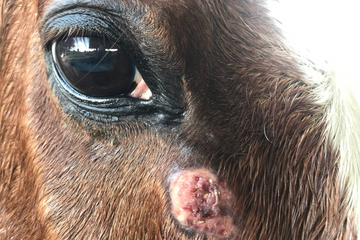Summer Sores in Horses: Prevention & Treatment
bis Parelli Natural Horsemanship auf Jul 10, 2024

Walking into the barn one day and seeing a large, oddly shaped sore on your horse can be concerning. Summer sores, also known as cutaneous habronemiasis, jack sores, granular dermatitis, and fly sores, are a skin disease in horses. These sores are directly connected to the life cycle of large-mouth stomach worms. Summer sores gained their nickname because the seasonal disease appears when the fly population increases in the spring and disappears with cold weather.
What causes summer sores in horses?
Adult stomach worms live in the horse's stomach, and while they can cause inflammation in the stomach lining, the more concerning issue is skin infections in wounds or moist areas. Females lay eggs, which are passed through manure. The larvae are then eaten by house and stable flies, which ultimately deposit them around the horse's lips, where they are swallowed, thus completing the lifecycle. These painful sores appear when the larvae of large-mouth stomach worms are deposited in open wounds, lips, nostrils, or genitalia. The larvae cannot complete their life cycle in these areas and instead cause a local inflammatory reaction, resulting in small, gritty, yellow nodules. These sores cause inflammation and intense itching, often leading to secondary bacterial infections, delaying healing.
Symptoms of Summer Sores
Summer sores appear as open lesions on the horse's skin and can range from mild to severe and include lesions that do not heal and itch. The skin lesions are moist, pink granulation tissue with an irregular shape. Sores are often surrounded by blood-tinged fluid as they drain and small, hard, yellow grains caused by the inflammation.
You'll notice excessive tearing and squinting if the horse's eyes are affected. If genitalia is affected, the horse may have a hard time urinating. In severe cases, horses may develop proud flesh. Most summer sores are found in wounds but can be found in any mucous membranes, such as lips, eyes, sheath, and genitalia.
As these sores are connected to insect and worm lifecycles, you'll typically see them during peak insect periods. These can affect horses, mules, donkeys, and ponies. Horses that have experienced these skin issues previously are generally more prone to recurrent infections.
Diagnosing Summer Sores
Skin lesions can be caused by a variety of infections and conditions, making diagnosis more challenging. Your veterinarian will take a detailed history and may biopsy the lesion. The presence of calcified formations (yellow, grainy tissue) and larvae can confirm a diagnosis of summer sores. Summer sores can appear as a secondary infection to skin tumors, so the vet will need to take a deeper biopsy to eliminate the possibility of a sarcoid or squamous cell carcinoma.
Treatment
Treating summer sores can be challenging. Effectively treating summer sores requires a multi-pronged approach. First, treat the intestinal parasites behind the sores. Second, treat the sore itself. Most veterinarians will clean the sore and administer ivermectin, anti-inflammatories, and topical antibiotic ointment containing steroids to help with itching and inflammation. Historically, vets would also prescribe antibiotics, but this practice is becoming less effective with the increase in antibiotic-resistant bacteria.
After the lesion is treated, the area should be covered to prevent flies from accessing it. While some sores will resolve when cold weather starts and the fly population decreases, it is important not to wait for treatment. Many sores will appear to heal in the winter months, only to flare up again in the spring. Untreated sores can be painful and develop proud flesh.
If proud flesh develops as a secondary skin issue, additional treatment will be required. Significant amounts of proud flesh can be removed surgically. Once the proud flesh has been removed, the vet can clean the area and apply topical ointments. The wound should be covered to protect it from flies and reduce persistent proud flesh.
Prevention of Summer Sores
Unfortunately, once your horse gets summer sores, they are more likely to experience recurring summer sores every year. Whether certain genetic conditions make horses more prone to developing these lesions is unknown. Since this issue is created by a complex connection between stomach worms and flies, disrupting their lifecycle is the most effective method of prevention. If your horse has never experienced summer sores, these fly management tips could help reduce the chances of this skin issue.
Fly Management Tips for Summer Sores
- Remove manure from fields and stalls regularly: larvae and maggots are ingested by flies from the horse's manure. Quick removal reduces the amount of exposure.
- Remove wet grain or hay from the barn: wet feed or standing water are breeding grounds for most flies.
- Consider a natural source of fly management like Spaulding Fly Predators.
- Keep horses inside during peak fly periods if needed: the timing depends a bit on your location, but dawn and dusk are peak times in the summer for most areas. You may need to adjust your turnout times as you go through spring, summer, and fall months.
- Use fly sprays, masks, and sheets: this reduces fly access to your horse, especially around those sensitive areas like eyes.
- Use fly strips and traps in your barns and runs: this reduces the fly population in areas where your horse is likely to stand for extended periods of time.
- Box fans can be installed in the barn to discourage flies: the constant breeze makes it harder for flies to land on your horse.
- Consider feed-through fly control: feed-through fly control can reduce the fly population at its source.
- Consult your veterinarian on deworming practices: routine fecal counts and deworming will reduce or eliminate stomach worms.
- Keep any wounds clean and dry: flies look for moist areas, so keeping wounds clean, dry, and wrapped (if needed) will reduce fly activity.







